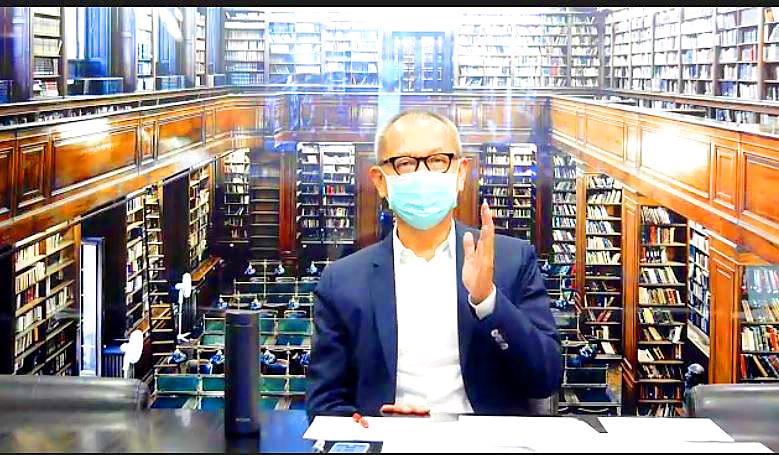Yageo Corp (國巨), the world’s No. 3 multilayer ceramic capacitor (MLCC) supplier, yesterday said that revenue would continue to grow sequentially this quarter, driven by resilient customer demand for premium passive components used in notebook computers, data centers and 5G-related devices.
The growth momentum is reflected in the firm’s strong book-to-bill ratio of 1.5, company chairman Pierre Chen (陳泰銘) told an online investors’ conference yesterday.
Lead times for high-end passive components stand at eight to 10 months, while Yageo only needs three months to ship standard passive components to its customers, Chen said.

Photo: Chang Hui-wen, Taipei Times
Yageo’s inventory has maintained at a low level of 60 days, he added.
“We have heard some noise about inventory in the standard product market. We are not concerned about demand in the premium market. Momentum in the premium market continues to build. We can continue to expect growth in the third quarter,” Chen said.
As it continues to expand in high-end markets, Yageo is confident that over the next two to three years, it can outpace the industry’s annual growth rate of 3 to 10 percent, Chen said.
In three years, premium products are expected to contribute 80 percent of total revenue, up from 75 percent, while standard products are likely to contribute 20 percent, down from 25 percent, Chen said.
The shift would help Yageo maintain a gross margin of more than 40 percent in the long term, as premium products tend to have a gross margin of more than 35 percent, he said.
In the long term, passive components used in vehicles are expected to be major drivers of growth, so the company plans to allocate 40 to 50 percent of the capacity at its new fab in Kaohsiung to that, Chen said, adding that the fab is under construction and would start production next year.
Yageo reported second-quarter net profit of NT$6.33 billion (US$225.49 million), an 11-quarter high and an increase of 92 percent annually, up from NT$3.3 billion, and 26 percent quarterly, up from NT$5.02 billion.
Earnings per share increased to NT$12.81, up from NT$7.01 a year earlier and NT$10.17 in the first quarter. Gross margin fell to 41 percent from 44.3 percent last year, but improved from 39.1 percent in the first quarter.
Yageo expects this quarter’s gross margin to resemble last quarter’s.
Revenue last quarter doubled to NT$27.71 billion from NT$13.47 billion last year, mostly due to the acquisition of US-based Kemet Corp. On a quarterly basis, revenue increased 16.7 percent, up from NT$23.75 billion.
MLCCs contributed the most revenue last quarter at 29 percent, followed by tantalum at 21 percent and chip resistors at 19 percent.

SEMICONDUCTORS: The German laser and plasma generator company will expand its local services as its specialized offerings support Taiwan’s semiconductor industries Trumpf SE + Co KG, a global leader in supplying laser technology and plasma generators used in chip production, is expanding its investments in Taiwan in an effort to deeply integrate into the global semiconductor supply chain in the pursuit of growth. The company, headquartered in Ditzingen, Germany, has invested significantly in a newly inaugurated regional technical center for plasma generators in Taoyuan, its latest expansion in Taiwan after being engaged in various industries for more than 25 years. The center, the first of its kind Trumpf built outside Germany, aims to serve customers from Taiwan, Japan, Southeast Asia and South Korea,

Gasoline and diesel prices at domestic fuel stations are to fall NT$0.2 per liter this week, down for a second consecutive week, CPC Corp, Taiwan (台灣中油) and Formosa Petrochemical Corp (台塑石化) announced yesterday. Effective today, gasoline prices at CPC and Formosa stations are to drop to NT$26.4, NT$27.9 and NT$29.9 per liter for 92, 95 and 98-octane unleaded gasoline respectively, the companies said in separate statements. The price of premium diesel is to fall to NT$24.8 per liter at CPC stations and NT$24.6 at Formosa pumps, they said. The price adjustments came even as international crude oil prices rose last week, as traders

Taiwan Semiconductor Manufacturing Co (TSMC, 台積電), which supplies advanced chips to Nvidia Corp and Apple Inc, yesterday reported NT$1.046 trillion (US$33.1 billion) in revenue for last quarter, driven by constantly strong demand for artificial intelligence (AI) chips, falling in the upper end of its forecast. Based on TSMC’s financial guidance, revenue would expand about 22 percent sequentially to the range from US$32.2 billion to US$33.4 billion during the final quarter of 2024, it told investors in October last year. Last year in total, revenue jumped 31.61 percent to NT$3.81 trillion, compared with NT$2.89 trillion generated in the year before, according to

PRECEDENTED TIMES: In news that surely does not shock, AI and tech exports drove a banner for exports last year as Taiwan’s economic growth experienced a flood tide Taiwan’s exports delivered a blockbuster finish to last year with last month’s shipments rising at the second-highest pace on record as demand for artificial intelligence (AI) hardware and advanced computing remained strong, the Ministry of Finance said yesterday. Exports surged 43.4 percent from a year earlier to US$62.48 billion last month, extending growth to 26 consecutive months. Imports climbed 14.9 percent to US$43.04 billion, the second-highest monthly level historically, resulting in a trade surplus of US$19.43 billion — more than double that of the year before. Department of Statistics Director-General Beatrice Tsai (蔡美娜) described the performance as “surprisingly outstanding,” forecasting export growth